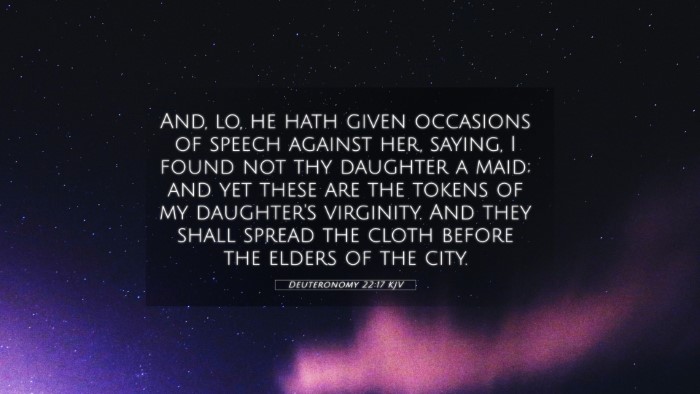Understanding Deuteronomy 22:17
Verse: Deuteronomy 22:17 - "And behold, he hath charged her with shameful things, saying, I found not thy daughter a maid; and yet these are the tokens of my daughter's virginity. And they shall spread the cloth before the elders of the city."
Summary of Meaning
Deuteronomy 22:17 deals with the issue of false accusations regarding a woman's virginity, presenting a legal context in the Israelite community. The verse emphasizes the serious nature of claims made against a person's honor and the required evidence to support such claims.
Commentary Insights
Matthew Henry's Commentary
Henry highlights that this verse reflects the importance of preserving the sanctity of marriage and the value placed on a woman's virginity within Israelite society. He notes that the man's accusation against the woman could ruin her reputation, and therefore, the elders are required to investigate the claims seriously. The emphasis is on justice and the moral responsibility of preserving truth amidst claims.
Albert Barnes' Commentary
Barnes explains that this law was designed to discourage slander and protect women. The phrase "tokens of my daughter's virginity" suggests that tangible proof (such as blood on a cloth) was necessary to establish the truth of the accusation. He also points out that the process intended to safeguard against frivolous accusations that could damage a woman’s societal standing.
Adam Clarke's Commentary
Clarke emphasizes the communal implications of such accusations. He notes that the act of presenting evidence before the elders signifies a communal response to personal grievances. Moreover, he discusses how this law reflects God’s concern for justice and truth, emphasizing the need for accountability in personal conduct.
Bible Cross References
To gain a broader understanding of Deuteronomy 22:17, it is helpful to explore the following cross-referenced verses:
- Exodus 22:16-17 - Addresses laws concerning seduction and engagement.
- Deuteronomy 22:13-21 - Provides laws regarding a man's accusation against his wife’s virginity.
- Proverbs 6:32-33 - Warns against adultery and the severe consequences of infidelity.
- 1 Corinthians 6:18 - Discusses the sanctity of the body and the implications of sexual immorality.
- Matthew 5:27-28 - Jesus expands on the commandment related to adultery and lust in the heart.
- 1 Timothy 5:19 - Advises against receiving accusations against an elder except with sufficient witnesses.
- Hebrews 13:4 - Upholds the sanctity of marriage and the seriousness of immorality.
Thematic Connections
The themes present in Deuteronomy 22:17 highlight the seriousness with which God views personal integrity and community justice. The verse sets the framework for connecting various teachings throughout Scripture about morality, reputation, and the social responsibilities of individuals within a community.
Cross-Referencing Insights
Understanding these verses through cross-referencing allows for deeper insight into Biblical themes and teachings. Here are some tools and methods for engaging in this type of study:
- Bible Concordance: A useful tool for locating verses and analyzing themes.
- Cross-reference Bible Study: Engaging with multiple scriptures that discuss similar themes can illuminate overarching Biblical truths.
- Comprehensive Bible Cross-reference Materials: Various Bible study guides provide categorized themes and scriptural connections for in-depth analysis.
Conclusion
The understanding of Deuteronomy 22:17 is greatly enriched through comparative Bible verse analysis and thematic exploration. The laws presented serve not just as historical precedent for Israel but reflect timeless principles about truth, honor, and justice that are central to the Christian faith.


